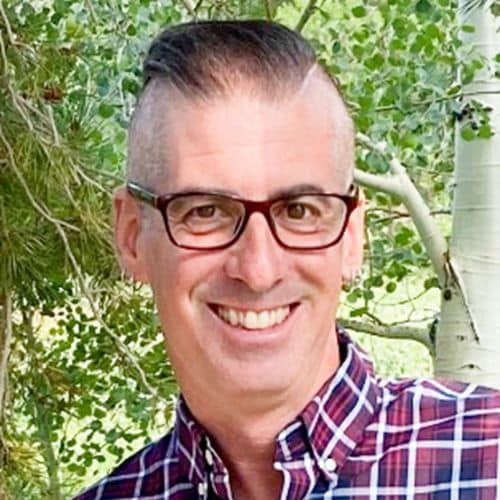Contents
Hello! Who are you?
I’m Erik DaRosa, Founder and CEO of From Survivor to Thriver, a mental health speaker and advocate, and co-host of the popular mental health podcast From Survivor to Thriver. I was born and raised in Somerset, Massachusetts, a small coastal town located about 45 minutes south of Boston.
In October 2011 I moved to Snowmass Village, Colorado with my wife, Amy, and two cats, Lincoln and Taylor. After almost two decades of living in New York City, which included the tragic day of 9/11, we both recognized we needed a change of scenery for both our mental and physical well-being. So, I traded in my 18-year career as a finance executive and haven’t looked back since.
These days I can truly say I am living in joy having found my passion for helping others as a mental health speaker and podcaster.
What is your struggle and when did it start?
I was diagnosed with Post Traumatic Stress Disorder (PTSD) in December of 2021, however, the signs and symptoms were kept well hidden from the world for decades. In fact, I spent the first 33 years of my life living in silence about my struggles, without a voice, afraid to remove the mask behind which I had been hiding since the age of 7.
Years of crippling anxiety had left me feeling both unsafe and insecure, overwhelmed and exhausted from my daily battles with obsessive-compulsive disorder (OCD).
The intrusive thoughts that were with me during most of my waking hours combined with the countless rituals that I performed to keep me “safe” from these boogeymen left me little time to be the kid and young adult that I thought everyone else was. I thought I was different, I thought I was broken, I thought I was the only one. If I had only known the truth back then.
How did this struggle make you feel at your worst moments?
Through it all, I hid my daily battles really, really well. For a very long time! I wasn’t “ok”, I wasn’t “good”, I wasn’t “fine”. I was struggling. Sometimes a little and other times a whole lot, but I was always struggling. Struggling in silence.
I never let anyone know. If I’m being truly honest, I never thought I’d be willing to share my personal journey so openly with my own family, let alone in any public forum such as this.
As I look back now, it didn’t have to be that way for me. And it certainly doesn’t have to be that way for anyone else!
At its lowest points, I often felt so alone that I could never imagine living a day without anxiety/OCD.
👉 Share your story: Help thousands of people around the world by sharing your own story. We would love to publish your interview and have a positive impact on the world together. Learn more here.
Was there a moment when you started to turn things around?
When I was 33 and in the throes of my first dissociative episode, I finally went to a therapist at the urging of my wife and, for the very first time, started unraveling all of these complicated things because I couldn’t take it anymore and I wanted to live a better life. And now I am.
The defining moment came in December 2021 when I was diagnosed with PTSD, a diagnosis that would forever change my life for the better. I now had a thing…something which I could identify…no longer just treat the symptoms but finally dig down to the root cause.
What steps did you take to overcome your struggle?
I’ve been and continue to be in therapy, and on medication, and I’ve added a mindfulness routine and reiki to keep me grounded and living in the present moment. It has been a lot of hard work, but, like most hard things, it has been worth it.
Discovering the sport of skiing, on the afternoon of March 27th, 2005, was a day that would change my life forever. In fact, that afternoon would create a life-changing transformation so great it would alter my career path for the decade to come.
A couple of months earlier, I had been in my therapist’s office in NYC, when, during one of our conversations, he softly suggested that I give skiing a try. Stubborn and defiant, as I often was back in those days, I blurted out “But I hate skiing,” a comment that makes me laugh to this day.
The truth is, I had fallen in love with a sport so foreign to me that I never once thought that it would become such a great source of healing and connection. In fact, Stratton Mountain, a well-known ski resort in Vermont and its ski run Upper Wanderer are where I truly began to heal from the severe anxiety and obsessive-compulsive disorder that had ruled my life since early childhood.
On that sunny and warm March Sunday afternoon, after a rather unsuccessful group lesson the morning before, a “collision” with a condo later that day, and a slightly more productive private lesson Sunday morning, I boarded the gondola with my wife, a life-long skier, and tackled my first top to bottom green run. What began on a lark would years later culminate in a successful career as a ski instructor here in Snowmass Village, CO.

Have you shared any of this with people around you in real life?
Yes, yes, yes. When it comes to my own mental health journey, I have opened the door wide for all to see. There are no longer any secrets or hiding behind masks when it comes to my day-to-day journey.
In fact, It is the reason I started my own podcast From Survivor to Thriver. For a very long time, I wasn’t ok but close-ended questions allowed me to hide my reality from the outside world. These days I happily speak on my own journey with overcoming anxiety and OCD, the importance of asking open-ended questions, how vulnerability is actually a superpower, and why we must meet ourselves where we’re at.
If you could give a single piece of advice to someone else that struggles, what would that be?
Talk about your struggles with someone else. Stigma says we shouldn’t talk openly about mental health. I say, we should! Stigma also says we shouldn’t stand high upon the mountaintop, vulnerable and transparent, for the entire world to see. I say, we must! We need to have these conversations about difficult topics!! We need to shatter these stigmas!!
Even just talking about hard things and bringing up uncomfortable topics can put us on the path to overcoming difficult things. We need to remind each other that we can do hard things!
Together, let’s work to break the stigma around mental health conversations and remind one another that it’s perfectly okay to not always be okay. And remind each other it’s perfectly okay to tell someone when you’re not feeling okay. Check in on your happy friends as they are often the ones who need it most. Just asking “How are you doing?” and taking time to listen to the answer can be extremely helpful.
Remember, you’re not alone in your journeys. We’re all in this together. There is hope, there is help and there is a way through. We all deserve to experience as much joy in our lives as is humanly possible.
What have been the most influential books, podcasts, YouTube channels, or other resources for you?
I am an avid reader and these three books, dog-eared and marked-up with my own reflective musings, have redefined how I both think and act as a person:
- Be Water My Friend: The Teachings of Bruce Lee by Shannon Lee: I was introduced to this book about 18 months ago when I had once again hit a low point in my mental health journey. As the book says, “We are not meant to be perfect, rather, be interested in your own process of growth.”
- Start With Why: How Great Leaders Inspire Everyone to Take Action by Simon Sinek: Looking back on my career journey, I now realize that I had been singularly focused on the “what”. After reading this book, I finally discovered my “why” and realized that affecting real change in the mental health space was my true passion.
- The Subtle Art of Not Giving a F*ck: A Counterintuitive Approach to Living a Good Life by Mark Manson: This book was recommended to me shortly after I had failed, for the second time, my Level 3 ski certification exam. Reading this book taught me about setting boundaries and the importance of saying no well before I had begun that type of deep work with my therapist.
Where can we go to learn more about you?
You can find new episodes of the From Survivor to Thriver podcast every Tuesday morning. You can follow me here on Instagram, LinkedIn, or Facebook. You can also email me directly.
Want more interviews?
Continue reading our inspiring case studies and learn how to overcome mental health struggles in a positive way!
Want to help others with your story? We would love to publish your interview and have a positive impact on the world together. Learn more here.

